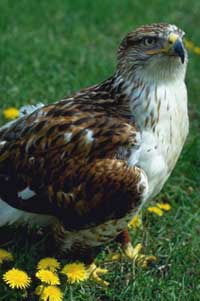| |
 |
 |
“HEALTH-B-GONE” AND OTHER HOMEOWNER PESTICIDE PROBLEMS
Is it Safe to Use Weedkillers and Bug Killers Where Kids and Pets Live?
|
|
One of the oddest things we've seen in our neighborhood is a yard that had two signs: One said "Caution, Children Playing"; the other said "Caution, Pesticides Recently Applied." We failed to find a third sign saying "Caution, Schizophrenic on the Loose," but the contradiction was clear enough.
The insecticide malathion and herbicides like "2,4-D" and glyphosate (a.k.a. Roundup) are widely used by homeowners and insistently claimed to be safe by the pesticide industry. Many people use these chemicals on their lawns and around the house where children and pets play, and some municipalities blanket-spray malathion from airplanes, ostensibly to control pests such as gypsy moths or mosquitoes.
Are these two pesticides truly safe? In 2003, the Canadian province of Quebec adopted a stringent "Pesticide Management Code" that, among other things:
- prohibited the use of synthetic pesticides in all daycare facilities and schools;
- banned the use of cosmetic pesticides on all public land; and
- banned 23 pesticides that are known or possible carcinogens or endocrine (hormone) disruptors.
Malathion and 2,4-D both fall into the last category. The herbicide 2,4-D also falls into the category of "cosmetic pesticide" since its primary non-agricultural purpose is to control weeds considered unsightly
 by property owners. The US EPA notes that malathion depresses levels of the important nerve enzyme cholinesterase and classifies the chemical as a probable carcinogen. A study also found that use of 2,4-D on lawns tripled the risk of a dog at the residence contracting some types of cancer.
by property owners. The US EPA notes that malathion depresses levels of the important nerve enzyme cholinesterase and classifies the chemical as a probable carcinogen. A study also found that use of 2,4-D on lawns tripled the risk of a dog at the residence contracting some types of cancer.
In addition to being a danger to people and pets, some portion of an applied pesticide always finds its way via rainwater runoff into local streams, rivers, lakes, and groundwater. The amount of contamination from your individual yard may not be much, but when you add it up across all the pesticide-treated lawns in a given area, it's a significant problem.
Some folks will likely choose to continue using pesticide products around the home until they have been shown beyond any doubt to be unsafe. But pulling up a few weeds by hand, planting marigolds near the garden to dissuade pests, or trying some of the available non-toxic pesticide alternatives is the approach the Grinning Planet team is trying. And we're keeping an eye on the sky for any government plane spraying a strange mist and trailing a banner that says "trust us"...
|
|
Pest control resources—natural/alternative methods:
See more articles about pesticides
|
|
INERT BUT NOT NECESSARILY SAFE |
|
The "inert" ingredients in pesticides can often have their own negative effects. Products can contain contaminants, too. For instance, the dioxin TCDD, which may disrupt immune system development, has been found as a contaminant in 2,4-D and is suspected as a contaminant in other pesticides.
|
|
|
|

For more reviews or purchase info, click on any title to go to Amazon.com
| |
 |
How to Get Your Lawn and Garden Off Drugs
A Basic Guide To Pesticide Free Gardening in North America
Helpful to anyone needing practical how-to information regarding pesticide-free gardening, soil health, lawn care, and how to deal with pests and plant diseases in a non-toxic manner. Well suited to newbies who just want to try it without having to go hippie. (by Carole Rubin)
|
| |
| |
 |
The Organic Gardener's Handbook of Natural Insect and Disease Control
Features encyclopedic coverage of the pests that bug all the planty things growing in your yard, including lawns, flowers, fruits, vegetables, and ornamentals. Excellent pictures help you identify specific diseases and pests so you can design the best pest-control program. (by Ellis, et al)
|
| |
| |
 |
Ask the Bugman!
Environmentally Safe Ways to Control Household Pests
Whether it's mice, ants, termites, or pests in the yard, the Bugman provides the most environmentally friendly solution. The Integrated Pest Management approach includes habitat modification, improved sanitation, least-toxic methods, and pest-specific baits. (by Richard Fagerlund)
|
| |
Or see more Books for a Better Planet
|
Back to joke page | More articles, by category
FREE AUDIO CLIPS

|
|
|
|
|
Hey, we don't pick
the Google ads! – GP
|
| |
| CLICKS ON OUR ADS AND PURCHASES VIA OUR AMAZON LINKS HELP SUPPORT THIS FREE SITE... THANKS! |
|
|
"Men are naturally most impressed by diseases which have obvious manifestations, yet some of their worst enemies creep on them unobtrusively."
— Dr. René Dubos
|
|


